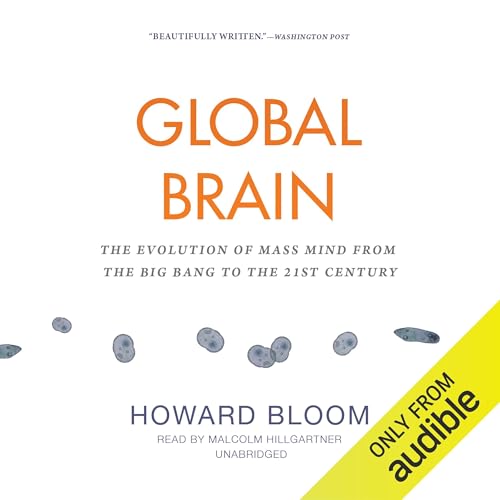
Global Brain
The Evolution of Mass Mind from the Big Bang to the 21st Century
No se pudo agregar al carrito
Add to Cart failed.
Error al Agregar a Lista de Deseos.
Error al eliminar de la lista de deseos.
Error al añadir a tu biblioteca
Error al seguir el podcast
Error al dejar de seguir el podcast
 Exclusivo para miembros Prime: ¿Nuevo en Audible? Obtén 2 audiolibros gratis con tu prueba.
Exclusivo para miembros Prime: ¿Nuevo en Audible? Obtén 2 audiolibros gratis con tu prueba.Compra ahora por $20.78
-
Narrado por:
-
Malcolm Hillgartner
-
De:
-
Howard Bloom
In this extraordinary follow-up to the critically acclaimed The Lucifer Principle, Howard Bloom - one of today's preeminent thinkers - offers us a bold rewrite of the evolutionary saga. He shows how plants and animals (including humans) have evolved together as components of a worldwide learning machine. He describes the network of life on Earth as one that is, in fact, a "complex adaptive system," a global brain in which each of us plays a sometimes conscious, sometimes unknowing role. And he reveals that the World Wide Web is just the latest step in the development of this brain. These are theories as important as they are radical.
Informed by twenty years of interdisciplinary research, Bloom takes us on a spellbinding journey back to the big bang to let us see how its fires forged primordial sociality. As he brings us back via surprising routes, we see how our earliest bacterial ancestors built multitrillion-member research-and-development teams a full 3.5 billion years ago. We watch him unravel the previously unrecognized strands of interconnectedness woven by crowds of trilobites, hunting packs of dinosaurs, flocks of flying lizards, troops of baboons making communal decisions, and adventurous tribes of protohumans spreading across continents but still linked by primitive forms of information networking. We soon find ourselves reconsidering our place in the world. Along the way, Bloom offers us exhilarating insights into the strange tricks of body and mind that have organized a variety of life forms: spiny lobsters, which, during the Paleozoic Era, participated in communal marching rituals; and bees, which, during the age of dinosaurs, conducted collective brainwork. This fascinating tour continues on to the sometimes brutal subculture wars that have spurred the growth of human civilization since the Stone Age. Bloom shows us how culture shapes our infant brains, immersing us in a matrix of truth and mass delusion that we think of as reality.
Global Brain is more than just a brilliantly original contribution to the ongoing debate on the inner workings of evolution; it is a "grand vision," says the eminent evolutionary biologist David Sloan Wilson, a work that transforms our very view of who we are and why.
©2015 Howard Bloom (P)2015 Blackstone Audio, Inc.Los oyentes también disfrutaron:




















Las personas que vieron esto también vieron:


Well written, but originally written in 2000
Se ha producido un error. Vuelve a intentarlo dentro de unos minutos.
Typically Insightful from Bloom
Se ha producido un error. Vuelve a intentarlo dentro de unos minutos.
Exhausting and Exhaustively Elaborate
Se ha producido un error. Vuelve a intentarlo dentro de unos minutos.
Genius.
Se ha producido un error. Vuelve a intentarlo dentro de unos minutos.
some very high highs but some rather low lows too
Se ha producido un error. Vuelve a intentarlo dentro de unos minutos.


